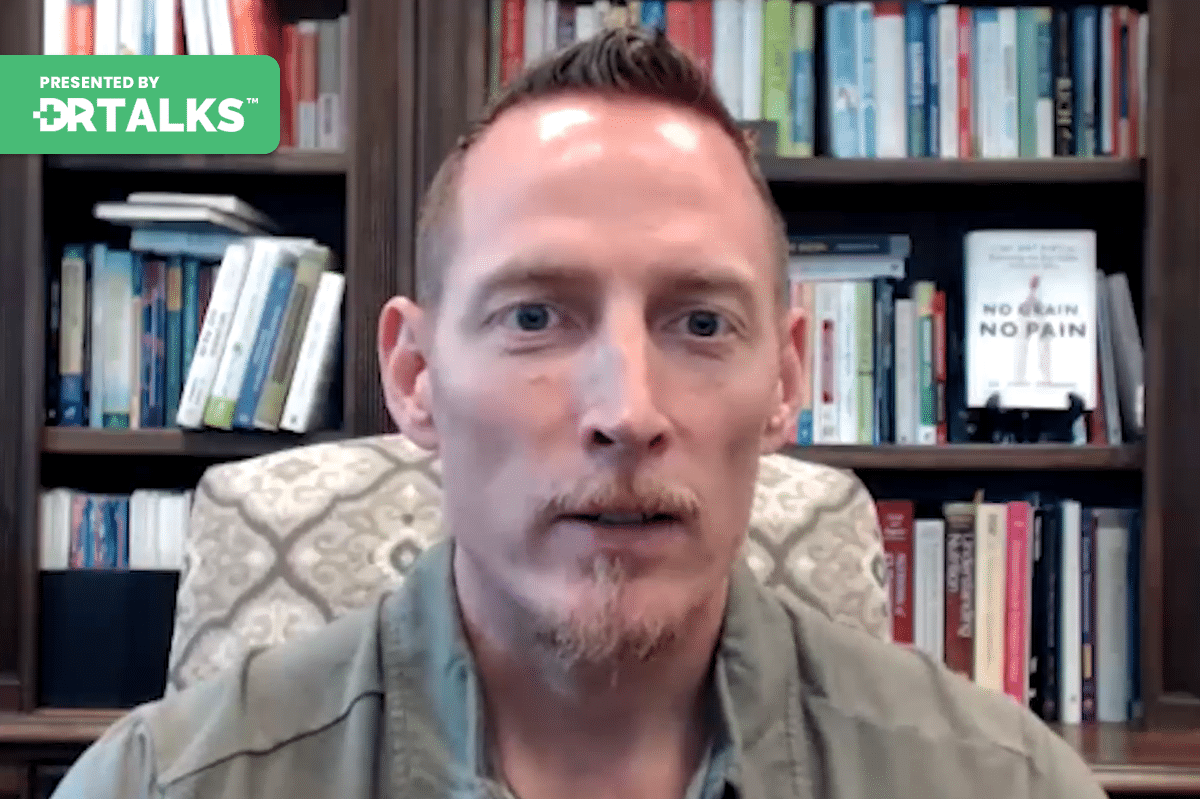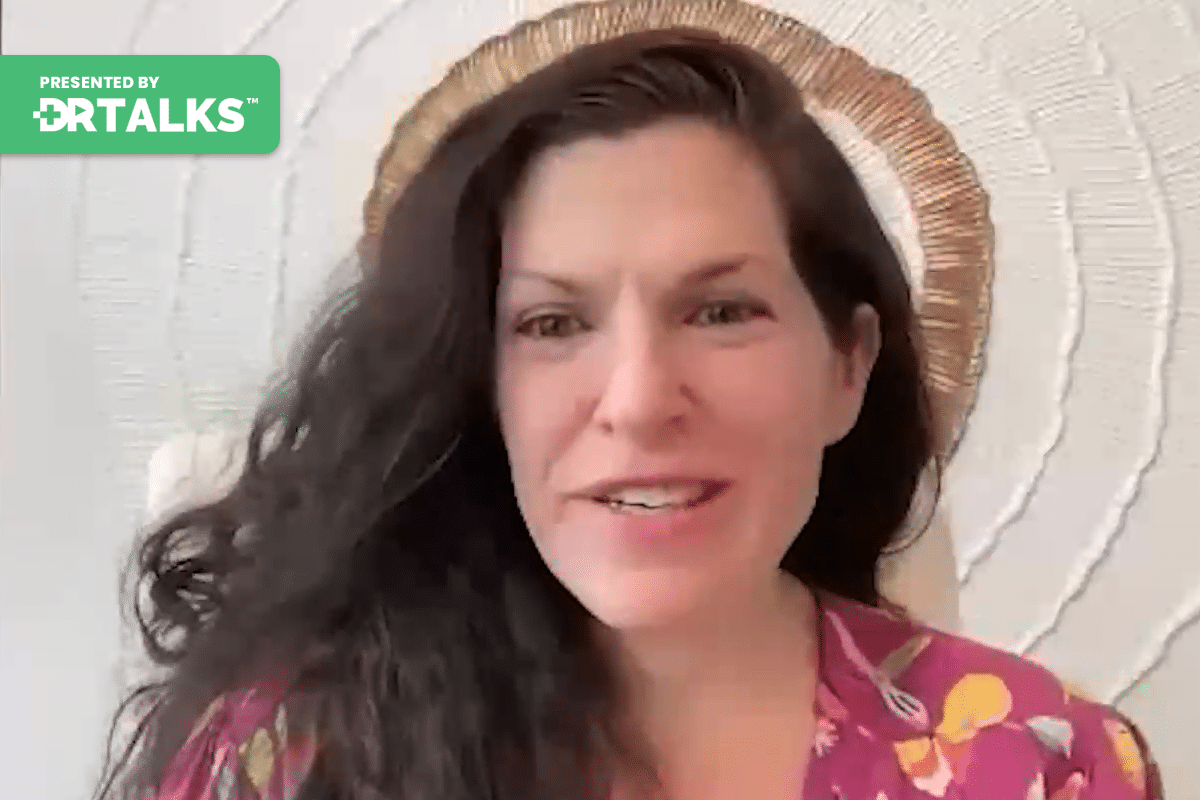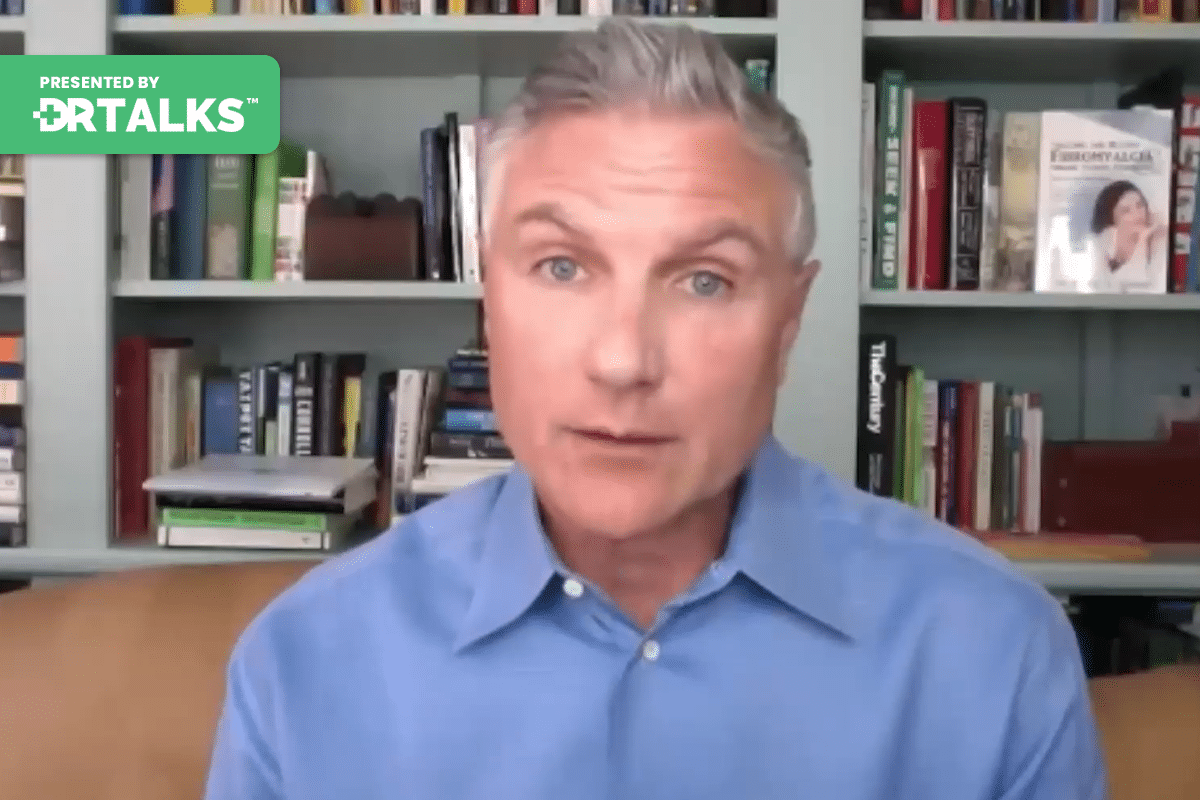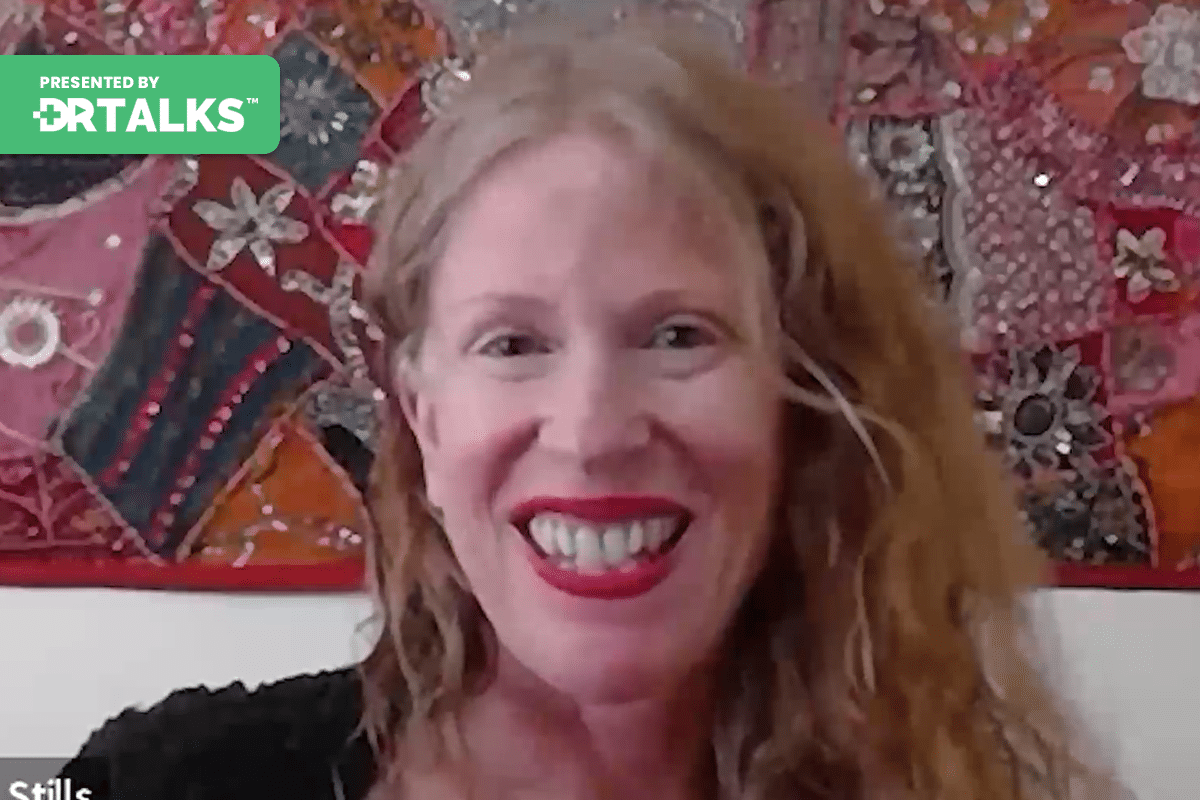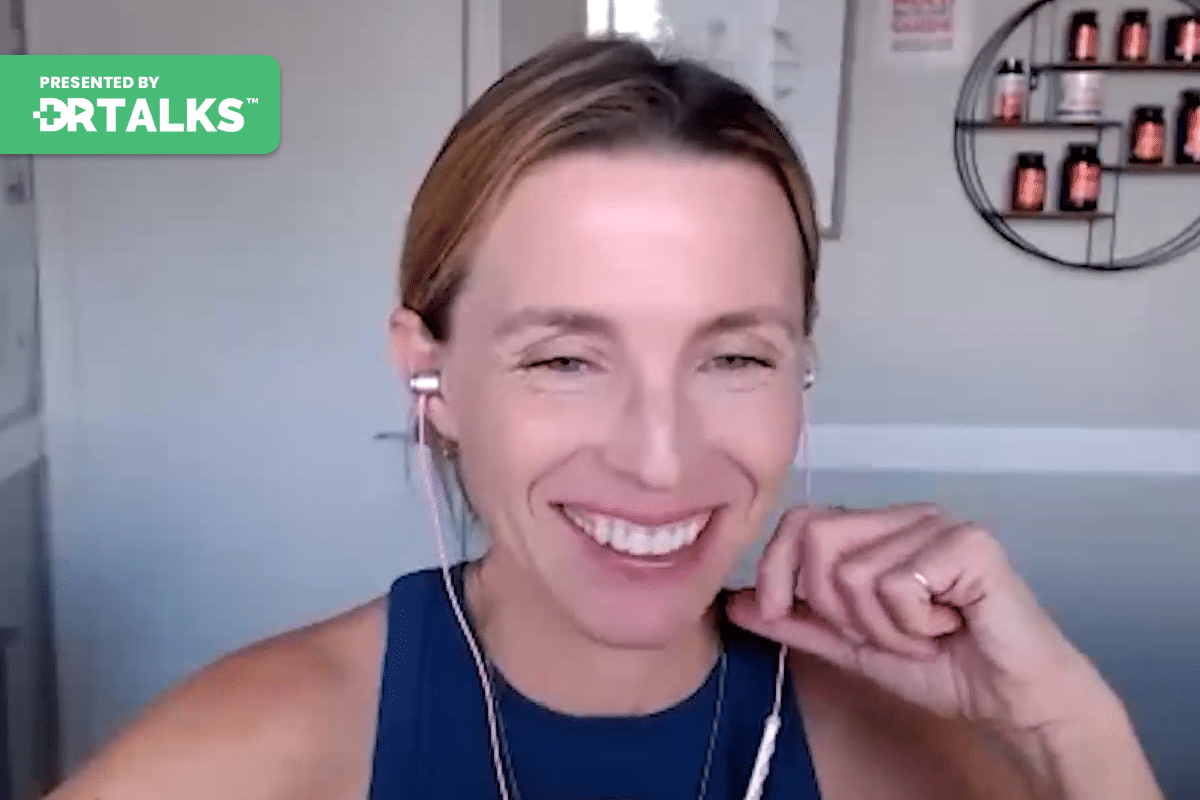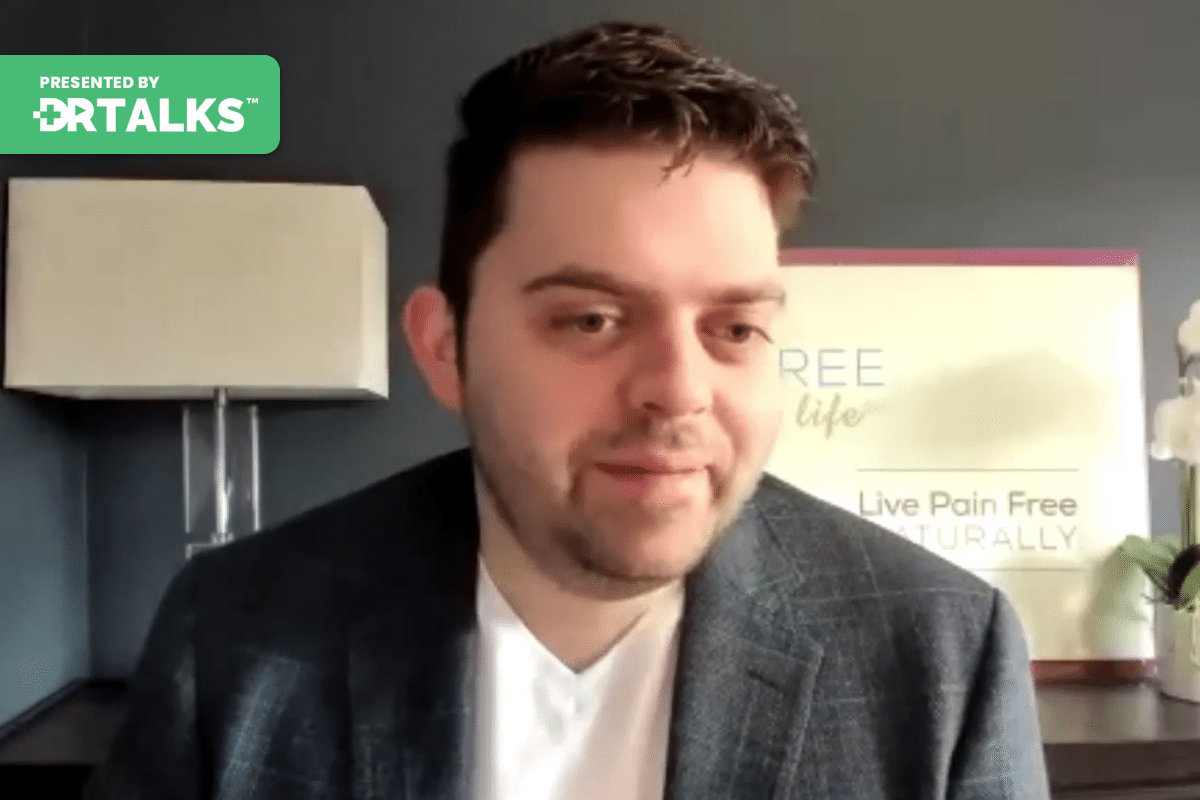Join the discussion below

Dr. Rodger Murphree is a chiropractic physician and board certified nutritional specialist. He is an internationally recognized fibromyalgia expert. His “Murphree Method,” a combination of functional and orthomolecular medicine, has helped thousands of patients get healthy and feel good again. He’s the author of 3 books for patients and doctors including... Read More

Dr. Peter Osborne is the clinical director of Origins Health Care in Sugar Land, Texas. He is a Doctor of Chiropractic, Doctor of Pastoral Science, and a Board Certified Clinical Nutritionist. Often times referred to as “The Gluten Free Warrior”, he is one of the most sought after alternative medicine... Read More
- What is gluten and how does it cause inflammation and pain?
- What is the connection between gluten and nutritional deficiencies and fibro symptoms?
- Find out how a gluten free diet can reduce your pain
Rodger Murphree, DC, CNS
Hi, this is Dr. Rodger Murphree, your host of the Freedom from Fibromyalgia Summit. And I want to introduce my colleague and friend, Dr. Peter Osborne. Dr. Osborne is the director of Origins Health Care in Sugarland, Texas. He is a doctor of chiropractic, doctor of functional medicine. He has his board certified as a clinical nutritionist, and he’s often referred to as the gluten free warrior. Dr. Osborne is one of the most sought after functional medicine doctors in the country. His practice is centered on helping those with painful, chronic, degenerative and autoimmune diseases with a primary focus on gluten sensitivity and food allergies. He’s the founder of the Gluten Free Society, the author of the best selling No Grain, No Pain, and the host of the Gluten Allergy Masterclass series, The Ultimate Guide for Going Gluten Free. Peter, I’m so delighted to have you here today.
Peter Osborne, DC
You’re welcome. It’s a pleasure to be here. Happy to share.
Rodger Murphree, DC, CNS
Hey, so in your practice, which is our functional medicine, like mine, you work with a variety of different patients, a lot of autoimmune disease, a lot of complicated, chronic type of illnesses. But you do see fibromyalgia. And how do you diagnose fibromyalgia? What is it? And how do you diagnose?
Peter Osborne, DC
You know, it’s a great question. And maybe your audience won’t like my answer. I don’t honestly. We can call fibromyalgia based on the criteria that, you know, that’s been set forward. But my opinion is the criteria is a subjective and opinionated, and it’s really a copout diagnosis. It’s like you’re tired all the time and you heard all the time. We don’t really know why. We’re going to say you have tender points over these areas of your body and we’re going to call that fibromyalgia. I don’t I don’t think that’s I don’t think that’s fair to the patient. And I’ll tell you why. The diagnosis serves to victimize a person. And maybe that’s not fair, because a person wants to know, what do I have? Like, what is wrong with me? Right. So I think to name the disease, to give it a name, if the criteria were ultra clear and ultra objective, then the name in the diagnosis would be perfectly fine. Yeah, but with fibromyalgia, that’s not true. And there’s a lot of conflict in the opinions about is fibromyalgia musculoskeletal predominantly in the muscle, or is it more like a sensory processing neurological problem?
And I think there’s a lot of people diagnosed by their rheumatologist or by their doctor with around here that don’t technically have fibromyalgia the way it’s supposed to be diagnosed. But because they heard everywhere and they’re tired all the time, they get the diagnosis. So they get kind of thrown into this category. And then if you start researching it, you get online. It’s like there’s really no treatment. You know, I can take this drug, I can take that drug. And that to me serves to victimize a patient and really send them down the rabbit hole of hopelessness. Yeah. So I like to look at it more along the lines of, okay, you have these sets of symptoms. This is true, right? We could cluster those symptoms and give it a name.
But I would rather instead of giving it a name that victimizes you, I would rather say, let’s ask a different question was ask why these symptoms exist. And if we asked why these symptoms exist and we go down the path, instead of trying to define what to call the set of symptoms, we can define why the symptoms exist. And we can also define a road map or a blueprint to navigate out of those symptoms. And it may be that that has always been more helpful for people because it gives them hope. And I think the number one ingredient to healing from any condition, no matter what it is, is a person has to feel like there’s hope on the other side. Like there’s there’s a path forward that’s not just this esoteric realm of doctor’s visits with different meds being thrown at them indefinitely just because and they have to accept it.
Rodger Murphree, DC, CNS
Yeah, well, I think that’s fair enough. I mean, I think you were careful how you were that to make sure that, you know, people didn’t start throwing stuff at the screen or whatever because, you know, they get a bad rap. People have fibromyalgia. I mean, they’re misunderstood. There’s a lot of doctors out there that still don’t acknowledges that, that it’s real. The you know, their family members probably don’t understand and a lot of times discount their symptoms, you know, kind of make them feel like it’s all in their head and they’re making this up their hypochondria, which is nothing further from the truth.
Peter Osborne, DC
Right. Then. That’s not what I’m saying either. Like, I’m not saying that your symptoms don’t exist and that you’re not feeling the way you’re feeling, right. I’m just offering up an academic debate as to how we would want to go about not victimizing you to be stuck in this state, that you have this perpetual disease where there’s no hope for treatment that’s effective long term.
Rodger Murphree, DC, CNS
Well, you in our practice, good medicine, as is Jeffrey. Jeffrey Bland talks about the father of functional medicine. We’re looking at what are the underlying causes of these conditions and, you know, fibromyalgia and I’m sure I’m going to say this in a bunch of these interviews, but it’s really important to to to hone this in, because people need to understand this paradigm and understand this the fact that fibromyalgia is just a name. It’s a name given to a group of symptoms that people have in common, and we give it that name. But that doesn’t mean that fibromyalgia causes the pain or the low energy or the insomnia or any things that go along with these with this condition is it? But, you know, what does happen for these folks? There’s a lot of times it can take a number of years and a number of doctors before they ever get the diagnosis and they finally get, you know, the rubber stamp on their forehead that says fibromyalgia. And and there’s a lot of times their initial reaction is, thank goodness, I’m not crazy. I’ve got something. But you’re right. Now, where do they go? Because in conventional medicine, it’s about a drug only approach, treating the symptoms, which long term doesn’t doesn’t work out or. Well.
Peter Osborne, DC
Yeah, everything has a cause. And to validate somebody’s victimhood with a name, this serves them. It’s a dishonest way to serve them with pseudo compassion. Right. And so true compassion is, is, is, is the frank truth, right? Yeah. Versus a pseudo truth that leads to treatments that again, are not going to have any really promising long term outcomes other than drug induced nutritional deficiencies and drug induced secondary and tertiary problems, because drugs, medicines don’t come without a price and you can use them to mask your symptoms all you want. And I’m not judging you if you are doing that. I’m just simply saying that you’ll never find a solution in that toolbox of symptom management through chemical manipulation without paying the consequence of side effects, and then again secondary and tertiary medicines to treat the side effects. And before you know it, you’re on five or six drugs. You forgot why you were taking them. Your doctors forgot why you were taking them.
And now there’s drug drug interactions, drug nutrient interactions, and you’ve collected another 25 symptoms that we can diagnosis 15 other diseases and then justify more drugs. And it just it never ends. And so I think the best way we could serve the fibromyalgia community is to recognize that we can use this name. But let’s be very cautious about letting that name create a hopelessness. And instead of focusing on the name, let’s focus on why the symptoms exist. And if we know what that is and we can investigate what that is, and most of it we ought to get into it. Most of it is diet and lifestyle. I mean, the vast majority of fibromyalgia change your diet, change your lifestyle, change your life. And it’s just that most conventional docs don’t talk about diet and lifestyle. They’re not trained in diet lifestyle, so they don’t even know where to begin. And so, you know, instead it’s just our eyes and, you know, and a plethora of other medications, they are feeling.
Rodger Murphree, DC, CNS
Well. And, you know, we’re not trying to step on anybody’s toes. We obviously are coming from them from a different viewpoint, specialize in both of us and functional medicine, really treating the person rather than the name. So I think this is exactly what you’re saying. I think this is kind of how I look at it. I don’t really if I’ve got it and if it’s got a name, great. But I’m not treating the name. I’m treating whatever is the underlying causes of these different symptoms. And, you know, that’s the beauty of functional medicine is we’re looking at what’s causing the pain. You know, it’s not fibromyalgia. That’s just a name, what’s causing the fatigue. And in your book, which I love, no grain, no pain, although I don’t like what it’s asking me to do sometimes, was asking me to give up.
Neither do my patients that I refer to. You know your book too. But you do a wonderful job of outlining how our guide in particular grains, can have a negative impact on our health. So there’s more and more studies that are coming out that are that are saying that in particular, gluten is a potential health hazard. And, you know, we’ve got this fad movement. Everyone’s going no good, no gluten. And and and there’s there’s reason for that, I think, is that finally the 100th monkey has been reached and people are realizing I think there is something to that. But we’re also seeing studies that correlate some of the driving triggers for fibromyalgia coming from gluten, in particular, and seeing some of the other side of it, definitely for gluten. So can you walk us through kind of what you know, what is gluten? Why should we avoid it? How does it affect us in such a negative way?
Peter Osborne, DC
Well, gluten is a family of proteins to make it simple. It’s not one thing. We use it as a singular term, gluten, but it really should be gluten. It’s a family of proteins found in the seeds of grass. That’s wheat, barley, riots, corn, rice, sorghum, millet, triticale, etc.. And, you know, we use it to make flour. We used to make bread, pasta, cereal, you know, beer. Right. Some other alcoholic beverages. It’s it is it’s a staple in the diet of most industrialized countries because most industrialized countries take taxpayer subsidies to grow more of it, because it’s super easy to grow. Most of it’s genetically modified or genetically hybridized. And so, you know, we have glyphosate that’s sprayed on it because it’s been engineered to tolerate this weed killer that’s actually a human poison. And so that’s not gluten, right? That’s just grain and general. So gluten is the family of proteins found in grains. How grains are grown is another matter. We can get into that in a minute, but what we know about gluten is that it for many people will interact with the immune system in such a way that instead of being perceived as food, it’s perceived as a threat.
And so then the immune system has this immunological response against it. And for some people that response is focused in the GI tract and it leads to a villous atrophy or a basically a damage to the intestinal lining, cause of massive malnutrition and subsequent inflammation. And so that’s celiac disease. And then we have what’s called non-celiac gluten sensitivity, which is where fibromyalgia kind of falls in line because there’s some people react to gluten and it damages your gut. Some people react to gluten and it damages other tissues. There’s a gluten can. It’s an equal opportunity destroyer. It can damage the brain, it can damage the joints. It can damage the muscles. It can damage processing of neurotransmitters. One of the things gluten does in the gut and it is it alters the microbiome and so some of these bacteria that live in our GI tract are very important because they make dopamine and serotonin, which are two neurotransmitters that regulate how we perceive pain and how we how we feel happy. Right, and how we sleep. And so gluten can affect those.
And that’s part of how gluten can contribute to fibromyalgia like symptoms, you know, from the gut perspective. But gluten can also cause inflammation in the brain, you know, leading to pain perception problems. And then gluten can also again, there’s I said earlier, there’s a lot of times people with fibromyalgia misdiagnosed true farm allergies really is really the nervous system not physical inflammation of the muscle. But a lot of people have physical inflammation of the muscles and they get a diagnosis of fibromyalgia and that can be gluten. And these, too, because gluten can cause my allergies. Gluten can cause neuropathy, right? So so it’s where it impacts a person’s health is dependent on the person. And the best analogy I can I can give you, Doc, is that if you give a thousand people aspirin, the same drug, right, you give a thousand people aspirin, you’re going to get different responses. You’re not going to get the exact same outcomes with all thousand people.
Some people are going to get gastric bleeding. Some people are going to have anaphylaxis and die. 13,000 people died last year from aspirin. Use proper aspirin, use some people, their headaches are going to go away and you’re going to feel just fine, right? Some people are going to road their mucous lining because they use it too much slowly over time. And it’s going to create iron deficiency or it’s going to create vitamin C deficiency. So again, there’s a gamut of different responses that different people can have because they’re different. Right. And again, the same way you can give gluten to a thousand people who are gluten sensitive and you might not see that all of them develop celiac disease and that there’s an array, a syndrome of array of different reactions, inflammatory reactions that people can develop.
Rodger Murphree, DC, CNS
So just to be clear, or those who don’t really know a lot about this, when they’re eating this protein, this gluten, wherever they’re getting it from wheat, barley, whatever it is, is that protein causing an allergic reaction or inflammatory reaction from the body or is the protein itself that form of the protein causing the damage? Both both.
Peter Osborne, DC
Yeah. So you’ve got one mechanism is that the gluten itself causes damage to specialized proteins in the intestine and that that damage leads to leakages across the gut barrier.
Rodger Murphree, DC, CNS
Now that’s the leaky gut, so that’s ruin is heavily associated with creating leaky gut and leaky gut is associated with just about every autoimmune disease that’s out there as well as now we’re starting to see studies about fibromyalgia and some of these other things, chronic illnesses. So part of that just eating that is creating that damage, that leaky effect of the intestinal tract. And then the other part is the body’s overreacting, thinks it’s under it’s under threat and really releasing cytokines or inflammatory chemicals that can attack really any tissue in the body, right?
Peter Osborne, DC
Yeah, because it’s a geographic location issue. So, you know, if 70% of the immune systems behind the gut wall called the gall, the gastro associated lymphoid tissue, and so a lot of the reaction can begin in the gut. But once the gut’s leaking, those immune reactions that gluten can cause can traverse through the bloodstream and land anywhere. I mean, so this is why gluten can for some cause pericarditis or myocarditis. For some people it can cause autoimmune hepatitis. For others it can cause skin, eczema, psoriasis, vitiligo, dermatitis for better form and or better form is so I mean, if once it traverses across the lining of the GI tract, it’s pretty much a superhighway access to every aspect of the body. And so you can get an immune response in any one of those areas. And generally it’s unique to the person. There’s not a no rhyme or reason as to why some people get nerve damage and other people get gut damage and other people get liver damage. But, you know, so that nobody can say specifically why that. But that’s the reality of what research shows is as well as what I’ve seen in my clinical practice.
Rodger Murphree, DC, CNS
Yeah. And he already made the connection, the brain gut connection. So that’s, you know, that’s something that is, you know, we’ve been reading about that probably for a decade, but now it’s becoming more and more people become more aware that their gut is actually connected to the brain. And any time you alter that environment, that microbiome, you run the risk that now you’re causing a this disconnect between the gut in the brain, that communication, or you’re creating something that shouldn’t be shared with the brain, right?
Peter Osborne, DC
Yeah. I mean, exactly. I mean that, you know, leaky gut leads to leaky brain, the barrier around the brain. And most people have heard the term blood brain barrier. Right. It’s the same kind of cell line as the barrier in the GI tract. And so just like gluten can damage the lining of the GI tract, it can damage the blood brain barrier, creating leaky brain. And so you get multitudes of effects. You have gluten damaging the gut, which leads to leaks, which then leads to gluten traversing and creating systemic inflammation and then subsequently possibly leaky brain. You have gluten creating an antibody response and then forming something called an antigen antibody complex which can damage any tissue in your body. You have gluten. Now they’re actually showing that there are they’re proteins like gluten that aren’t gluten. One particular, for example, in wheat is called an analyze trypsin inhibitor that binds in the gut to immune receptors called toll like receptor stealers.
And these toll like receptors create a cascade of immune response. Again, that can also cause leaky gut in a different way. Right. And you have gluten that can damage certain kinds of bacteria altering the microbiome. So that’s altering the way we digest our food. Because remember, the microbiome, what does it do? It helps us digest our food. It secretes mucin which lines the GI tract to prevent it from leaking. The good bacteria in our gut has something called immune crosstalk, where it communicates with the gut’s immune system to prepare it for what’s coming. So like, there’s this telephone line between the bacteria and the immune system and they talk to each other like, Hey, we got some nasty stuff in the food coming through, make some stuff to neutralize it. And in the gut, this is like, sure, thanks for the heads up. And you know, they talk to each other, right. And so that keeps the immune system appropriately responding.
And then you now have research that shows gluten alters, you know, as it alters there’s microbe, there’s microbiota that certain species of bacteria make vitamins. Right. So like, you know, you’re making, you know, biotin or vitamin K that’s made in your gut. Other B vitamins are made in your gut. These B vitamins play a vital role in the mitochondrial function of energetics. Right, of how we make energy. And this is goes back to the core of, you know, some of the research on fibromyalgia is that it’s a mitochondrial disorder. This is just another field of that. And so you don’t have adequate B vitamins, your mitochondria slow down, their ability to generate energy slows down. You start developing chronic pain and other issues as a result of that. So there’s all these different unique mechanisms.
Rodger Murphree, DC, CNS
Is a lot of moving balls with this. I mean, it’s not just you’re eating gluten, you have an allergic reaction. I think people kind of associate that. It’s much more involved in that many, many different aspects and bringing up the nutritional deficiencies, which is a big one for these folks. And the fact that those are fibromyalgia, we now have less mitochondria, typically just the way God made them genetically and many of the mitochondria they have are just couple. They’re not working like they’re supposed to. So you’ve got these trillions of mitochondria that are supposed to be generating that energy that that cell and that organ and that tissue and the body needs. And you sabotage someone’s already. That’s their weak link because they have this damaged gut lining and they’re generating inflammatory chemicals, but they also don’t have the B vitamins and other things they need to to fuel these mitochondria.
Peter Osborne, DC
Yeah. I mean, if you think of it, most people think of mitochondria as energy, right? So it’s like I feel energetic. No, I mean, energy is what we really mean when we say energy, mitochondria speaking is it’s money in the real world. You need money to pay for clothes and food and shelter and to buy the things that are necessities. And in the biochemical world you need. ATP Yeah, and that’s what mitochondria are supposed to make. And so when you don’t have real money in the body biochemically speaking, you heal more slowly, right? Yes. You also are tired because you’re not producing energy, but you cannot heal and repair. And so what’ll tend to happen with mitochondrial dysfunction in fibromyalgia patients is they’ll be in a repair deficit. Right. So the mitochondria aren’t functioning. It’s think of it like you’re at your budget. You oh, you spent more money than you had your bank account.
Then the creditors start calling in on you and they start repossessing everything you own. Well, this is what happens in your body. Your body says, okay, we can’t make and generate enough energy through the mitochondria. We need to start recycling material. We need to start, okay, we’re going to take away your muscle. We’re going to start breaking your muscle down in an effort to get it resources that your muscle is storing. Right. Because muscle is a long term, short term storage of protein, which we use to make antibodies, which we use to fight gluten and other chemicals and other things in the environment. So we’re now auto metabolizing, we’re breaking our own body down to get to the resources because we don’t have the capacity to make the energy from the mitochondria. And so we dwindle, we start to waste. We’re basically we’re aging at a much accelerated pace and we don’t have the capacity to heal or repair efficiently.
Rodger Murphree, DC, CNS
So a lot of times patients will say, oh, I’ve been I’ve been tested for gluten and it’s negative. You know, I don’t have a problem with that or I don’t ever feel any symptoms when I eat wheat or, you know, wheat gluten. You know, there’s such a disconnect. But from what you’re sharing, a couple of things I think are important to point out. Number one, you don’t have to have celiac and most people don’t have celiac. Right. But you still can have a you can still have an ill effect from eating gluten. Number two, you don’t have to have an allergy to it. You can be, as you mentioned, you could have a sensitivity to it that’s creating this, you know, creating a weak link for you. And big part of that is, is the leaky gut, which is not not not necessarily an allergic reaction.
Peter Osborne, DC
It’s not at all an allergic reaction. A true allergy is mitigated by IGI. So I if you you know, if you’ve ever had an allergy, if you’ve ever experienced an allergy, you know, you eat a food, for example, and your lips swell your throat closes down, you break out in hives, you know, your your stuffy, your watery, you know, through the sinuses. You know, those are true allergy symptoms. And so I think it’s important that people understand that an allergy is not the same thing as a sensitivity. It’s a different arm of the immune system. Activities are typically more subtle and so it’s like slow poison, right? It’s not like I ate it. And then immediately I feel horrible or immediately I feel bad. And some people do, but not all do. The other unique thing to mention here, though, is gluten is very unique and that as it’s being broken down in the GI tract, one of the proteins that can form is a morphine like compound called gluten morphine.
And so guru and morphine is a natural painkiller, right? So if you think about morphine, the drug, right. People being on narcotic drugs like morphine, they take it for pain control, usually in severe cancers, painful cancers and the like. But gluten has the ability to mask its own toxicity because as you’re breaking it down in the GI tract, some people break it down and form morphine, and then that morphine hits your pain receptors and blocks the damage that that gluten is actually causing so that you actually don’t feel it. And so now here you are eating it every day, not necessarily feeling terrible. Right, but also getting high because morphine is very addictive. And this is one of the reasons why a lot of people, you know, when they try to get off of gluten, they feel worse, like they have this withdrawal, almost like a drug withdrawal. It’s not really almost a drug withdrawal. It is a drug withdrawal. It’s a drug withdrawal because of that morphine like effect. And so they get fevers, chills, shakes, pains, fatigue, irritability, mood swings, you know, headaches, nausea, vomiting when they try to get off of it because they actually have a gluten, morphine, compound addiction. And they and they don’t even know it. Right. And so they eat the gluten and it makes them feel good. It gives them a high. It actually literally, you know, when I eat bread, I feel better. Right. And so they would never suspect it as being a potential possibility or playing a role in why they’re chronically ill.
Rodger Murphree, DC, CNS
Yeah. Yeah. So in my fibromyalgia, but one of the first things I talk about is the importance of a healthy diet and finding out if you have any sensitivities or allergic reactions. And so big fat elimination diet. Now, when I’m working with my patients like you, I’m testing. So it really kind of takes all the guesswork out of it. But I find that just about every every patient that I work with who goes on like a paleo diet, which I’m a big fan on, big fan of, or the keto diet, I think there’s, you know, there’s a proper time for people to be on that as well. But basically coming off grains, they feel better. I mean, it doesn’t take that long before, you know, there’s an initial shock. You know, people give these things up and, you know, maybe they go in withdrawal symptoms a little bit for a few days. But then after that, they realize, wow, I do feel better. Or I have people that go off these, you know, go off the grains and then whatever foods we test for, show allergies. And then there maybe go off the wagon and they’ll challenge their food back after being off of it for, you know, a month or so. And wow, they have like this incredible negative reaction that they never experienced before, but it’s because they took it out of their diet. And when they put it back, it was just it was magnified. And now they actually can experience it’s that this thing was really probably giving me trouble all along. I just never knew it.
Peter Osborne, DC
I mean, elimination diet is one of the best and freeways. Yeah, it really test foods. I think it’s I think it’s a very good idea if you especially, you know, in the realm of functional medicine, some people are frustrated, is frustrated by the lack of the fact that, you know, no insurance is really going to cover it. But diet changes free, doesn’t cost you a dime and an elimination diet is free. And you can garner a lot of great information about what foods might be triggering you, including grains and grain.
Rodger Murphree, DC, CNS
Well, the only way to overcome fibromyalgia is to get healthy. And that sounds simplistic and simplistic, but a big part of that is you got to change your diet. I mean, you can’t get healthy on an unhealthy diet. So eventually you got to make that change. You got to come to terms with. And I say all patients that now typically a healthy diet is the long game. It’s going to take time to see results. You can change the micro nutrients, you know, the different vitamins, minerals, amino acid, essential fatty acids. And you can see results quicker, but you can’t get where you want to get without really looking at your diet and cleaning that up. And a big part of that is, is what you’re sharing with us, you know, today. So in your practice, when you’re working with some fibromyalgia patients and you’re educating them about the potential dangers of these grains, do you get some do you get some blowback from that? Or because you’re, you know, the grain warrior, the grain I mean, the gluten world, I mean, you know, world known people already know that’s kind of what they’re getting into when they start.
Peter Osborne, DC
And so I Think my practice is probably biased in that direction.
Rodger Murphree, DC, CNS
Yeah, they already know it is. Is something I got to work on. Yeah.
Peter Osborne, DC
Yeah. Years ago I had this is probably close to 20 years ago and I diagnosed a girl, not a girl. She was she was a housewife. She was a mother. Anyway, she, she had gluten sensitivity. She had fibromyalgia, severe. And she looked at me, you know, we always test I always did test on gas. She looked at me, tears started coming out of rye and she said, I can’t do this. I just can’t do this. I said, What do you mean? She says, I just can’t imagine the thought of not ever eating birthday cake again. And she laughed. And that was the last time I ever saw Wow. I don’t know what happened to her, honestly, I don’t know. But I know that for her, she was not willing to change your diet. Now, today, in my practice, we you know, most people know me for gluten. That’s kind of you know, that’s kind of what I’m known for in in the alternative medicine world. And so today, when people come to me, they’re hoping they’re not gluten sensitive, but they’re really ready to change your diet. And I would say this to anybody who’s who’s looking to see a functional medicine expert, you really at the end of the day, you have to be embracing of change. There’s a psychology to this that you have to match if it’s going to work for you.
Because if this isn’t true for you, it won’t work. And that is the level of pain, discomfort and disease for you has to be greater than your fear of change. Because when you come to see somebody like me or even like you, doc, you’re going to make changes for them. You’re going to, you know, help them make changes, you know, make the changes. You’re going to guide them to the changes they need to make based on objective laboratory and objective science and in clinical experience. And so they have to be willing to embrace those changes no matter what they are. I mean, what my favorite litmus question for anyone that wants to come see me is, are you willing to change your diet and above and beyond what you think is reasonable for society today? And if the answer to that question is no, I’m not a good fit for you. You should seek out somebody else’s opinion. And Edison might be a better option for you, because there are some people philosophically with medicine is a better fit. No, I’m philosophically I don’t agree with it, but it’s their life. It is their choice.
And some people would rather medicate and change their diet because the fear and the well, let’s just say the pain of changing their diet is greater. Right. And so for them, it’s not the right fit. So if you’re watching this and you’re kind of on the fence, you know, if you want to get your health back and in a functional way, you really have to come to terms with the necessity of change, because the reason you’re sick is because you’ve been doing it wrong. So we can figure out what you’ve been doing wrong. Right? Again, objective testing helps us to understand that. And then you can embrace that you were wrong, which is tough to do. It’s it’s look, it’s hard. And you’ve been doing it wrong. You know, I’ve done things wrong in the past. I used to run a lot more some types of tests than I do today. And, you know, after your experience, you kind of figure that’s not what we’re going to do anymore and you have to come to terms with that as part of growth. How you grow is to be open to learning and be open to saying I was wrong, I did it wrong, and now I’m open to embrace this change.
Rodger Murphree, DC, CNS
Yeah, well, I think, unfortunately, most people have such a disconnect with the foods that they’re eating anyway. You know, it’s good. It’s, you know, that’s fine. That I mean, that’s in some people who are trying their best to eat healthy, but they’re just misinformed, you know, going gluten free has been a topic in my household for, gosh, you know, a long time. My wife has gluten sensitivity. She doesn’t have celiac. But it’s really it’s you know, it’s pretty clear because when she starts eating gluten, she has eczema on her hands. I start to peel away. And once she goes off that gluten, she’s fine. Everything clears back up. So it’s pretty you know, it’s pretty clear for her. But, you know, but a lot of my patients, you know, they see the benefit because they’re feeling better. They have less pain. You know, their brain fog starts to improve, then they fall off the wagon, you know, and then it’s a matter of explaining to them when I’m talking to them, you know, on the telephone, telephone, cancer, they tell me I’m having a flare up. I was doing great. And all of a sudden now I’m fibro flare.
What do you think’s going on? My first question. What did you change in your diet? Yeah. And sure enough, it’s going to be typically it’s going to be a grains typically are going to be, you know, gluten that they have added. I didn’t even think about it. Just, you know, hey, I was just out want to have a slice of pizza or and for most people maybe that’s not such a big deal. But there are people, including a lot of people that we see with fibromyalgia, that that’s a weak link. And if you don’t share that up, it’s going to be your Achilles heel.
Peter Osborne, DC
Yeah, I mean, that’s absolutely true. The diet is a slippery slope once you start letting things in, too. I like to test, too, for gluten sensitivity genetically, because if you know you have the markers, you there’s less wiggle room like a rotation diet or an elimination diet. People can do that and they can learn a lot, but they get to this point where the pressure of society, you know, the pressure of, you know, family, it’s like, well, we’re going to go out to eat or we’re going to go to grandma’s house or we’re going to go do this. And there’s, you know, invariably there’s always some kind of a cake or bread or roller coaster. And so they kind of get drawn and pulled in that direction, even though they know they shouldn’t. They do it anyway. And one of the reasons psychologically why they do that is because they don’t have a definitive reason as to why they should never do that.
Yeah, and you know, if it’s of any consolation to the audience, people that have gluten sensitivity or have a fourfold increased risk of mortality if they don’t stop eating gluten, I mean, think of that. I mean, it won’t kill you tomorrow or kill you at the dinner table tonight, but it will kill you and it will kill you faster and it will kill you miserably. Right? Nobody with fibromyalgia feels good once. And it is like, Oh, I love my wife and I love the way I feel, you know? Now do that for ten years, in 20 years and 30 years, and then die early. That’s a miserable existence. Right. And so you have to have a good grasp or handle on is this the right diet for me and is this an indefinite diet for me? Because If you don’t know that, you’re going to find yourself lulled back into cheating and making mistakes because it’s human nature. Everybody does it. It’s, you know, it’s just who we are. We are error prone people. And the more definitive you can be about what is necessary to maintain your health, the better off you’re going to be.
Rodger Murphree, DC, CNS
Now, in your book, in your practice, you really talk about no grain. So we’re talking about no grains whatsoever. When your patients consult with you, that’s your advice to them is to go ahead and give off all grains. Why is that? I mean, we’ve had this conversation, which is a challenging one for me, because I can give up wheat even. I love pasta. I mean, everything about it’s Italy but rice. Come up here. Let me have a little rice every once in a while. Come on, man. But there’s a reaction to that for some people, right?
Peter Osborne, DC
Yeah. I mean, if you first you have to define gluten properly. The FDA defines it. You know, they define it based on a 1953 definition, which is you have Glidden, which is found in wheat. You c Cohen which is found in rye and you have Horton which is found in barley. And so those three are the three gluten proteins that they define as gluten. So when you hear that word gluten, it’s actually it’s not gluten, it’s these other proteins that.
Rodger Murphree, DC, CNS
It’s actually plural. Yeah.
Peter Osborne, DC
Yeah. And so but the problem is, you know, when we start really moving beyond 1953 research, you see that rice has gluten called ORS in it and corn has gluten, it’s called zayne and oats have a gluten called Aveton. And if you look at a number of the research studies, they show damage when people with gluten sensitivity partake of these other grains as well. Now there’s quantitative differences in how much gluten is in different grain. So, for example, wheat by percentage, 70% of the protein and wheat is gluten on average, 69, 70%. That change is based on where it was grown in the soil, in the rain and everything else. But again, average.
Rodger Murphree, DC, CNS
Yeah.
Peter Osborne, DC
Whereas rice has 5% gluten by difference.
Rodger Murphree, DC, CNS
Big difference.
Peter Osborne, DC
But then we go back to how much gluten causes damage. Okay, 20 parts per million. That’s the size of a breadcrumb, you know, that’s the size of a drop of water in a gallon of water.
Rodger Murphree, DC, CNS
Yeah.
Peter Osborne, DC
And so if you are doing that regularly, you’re going to create inflammation for up to 2 to 3 months. Every time you get exposure.
Rodger Murphree, DC, CNS
Wow.
Peter Osborne, DC
And so when we look at, you know, the research on gluten antibodies, for example, the half life of a gluten antibody is about two months. That I mean, what that means is for your body to break that antibody down and get rid of it and push it on out. It takes that long right. If you eat gluten and and only a little tiny amount and you create an inflammatory immune response that leads to antibody production, it’s going to take your body a few to clear that antibody, which means as long as that’s there, it’s doing damage. So you have this and again, it’s dose matters, right? So, you know, you could do a little and you have a little damage for a long time. You could do a lot and you have a lot of damage for a long time. What we want is to not eat food that creates damage for any amount of time, ideally. Right. And so the other part of the research that was very eye opening for me early on in practice because what I would discover was people going gluten free would ultimately they would be grain free by accident because they were paralyzed. They didn’t know what to eat.
So they just would need it. They were barely eating and so they felt so much better. But then once they discovered that there’s this gluten free bread substitute, maybe it’s corner rice or you know, gluten free pasta over here made out of corn rice, they would whiplash back into symptoms. That’s why we call that gluten free whiplash. And so I started to see that happen on a huge scale. And when it really started to happen, I remember it very clearly because it was about 15 years ago and I was in my practice and the grocery store across the street from my practice was in my practices in a medical complex. But across the street there’s this big KRodger grocery store. I remember the day they put in the gluten free food out, and I thought to myself, I help do that. But then it was shortly after that that I started seeing an influx of my patients who were like, I don’t know what’s wrong, I’m sick again.
And so I kind of correlated that and. Then some research papers came out on 90, you know, one of them was, was a study done on refractory celiac disease. Refractory means people went gluten free but didn’t get better. Okay. And in this one study, it was like a five year study and 92% of the patients enrolled in this study failed to have repair of their villi, even on a gluten free diet. And another study came out and it was like 48% had persistent intraepithelial lymphocyte ptosis in their GI tract and they still had persistence symptoms. They weren’t as bad, they were better. But, you know, the problems were still there. And many of them ended up developing with all my cancers and other problems. And so I was like, okay, now I’m thinking, okay, maybe there’s something to these gluten free foods. Maybe it’s something in them, you know? So now I’m looking at the ingredients of these gluten free foods because they, again, go back 15 years and we didn’t have this huge industry was food was not $1,000,000,000 industry.
Rodger Murphree, DC, CNS
Yeah.
Peter Osborne, DC
And it two ingredients that kept popping up were corn and rice. So then I started doing some research and into the plant world of things. The botanical research is where I actually found TJ Osborne’s work. We’re not related. He’s called the father of plant biochemistry and he actually was one that actually originally fractionated gluten proteins. He is the one who created the chemical process on how you isolate and identify gluten proteins. And so he defined gluten in his work as the proteins found in grains that are soluble in alcohol. And he didn’t limit his definition to wheat, barley and rye. It was all grain. Wow. And so these different grains that were soluble in alcohol, these gluten were sub classified into different categories. You have problems and you have another category called gluten lens. And then you have alpha, gamma and omega varieties of these proteins.
So he really kind of nailed it down molecularly. Right. And so I was looking at his work and then I came across some papers from some really great scientists in South America because the staple diet there’s corn. And what they were finding was that a lot of the celiac weren’t getting better. And so they started looking at corn gluten the same and they started finding autoantibody reactions to, say, in these patients. And so then more research was done. This was dying in 2012 was this study that was published on HLA VQ genotyping, which is the genetic testing that’s done to identify gluten sensitive genotypes. And they found that people with celiac genotypes reacted to corn gluten more than wheat gluten, which I thought was interesting. And then another study came out and I want to say it was a group of Australian researchers and they, they isolated 400 new gluten proteins, found in grains.
Wow. And 40 of them were more toxic than Glidden. Okay. So, so you know, you follow this all this research and you kind of you’ve got to dove deep into it because it’s not real easy to find. Right. And so but that’s what I did. And so as I was going through all this and learning all this, I started to apply it. I just said, okay, we’re not going to do the gluten free food aisle. You’re if you’re going to you know, if you’re going to get a substitute, we’re going to do almond flour. We’re going to do something. You know there is not a grain, and we’ll see how you respond. And what I found was a 100% across the board, the people that had gluten free whiplash when we took away the process, gluten free foods that were laden with other grains, they got better again.
Rodger Murphree, DC, CNS
Interesting. Yeah.
Peter Osborne, DC
That was just kind of my journey over the years and so that’s why again, when I wrote No Grain, No Pain, I incorporated all the research that I had found over the years. And as well, my clinical, you know, my clinical stories and anecdotes and case studies. And, you know, I’ve yet to see a patient who successfully went gluten free, who then started eating corn, rice and other grains that didn’t have whiplash.
Rodger Murphree, DC, CNS
It’s important to point that out. Well, those of you that are now just totally floored and just really upset that you’re going to have to give up grains, you owe it to yourself. If you’ve got a complicated illness like fibromyalgia or an autoimmune disease. I mean, you got to take you got to really look under every rock, every stone to put this puzzle back together. And fortunately, Dr. Osborn has done the research for you. I mean, it’s there, Peter, I really want to recommend you. I’ve already mentioned a few times no grain, no pain, wonderful book. I highly recommend it just for your library to go through it and look at it and realize the science is there. But your website tell me about your website. You got a lot of free resources there, so that’s probably your first step is just go to your website a little bit more about this day.
Peter Osborne, DC
I mean, if you if you want to do a deep dove on gluten, gluten free society board or foundation, there are over 2000 video tutorials and articles from every topic you can imagine involving gluten. And we also have a master class. It’s free. We made it free to the public. It’s a 14 hour deep dove with scientific references. Actually created it originally for doctors because I got tired of having to get on the phone with GI doctors and educate them. So I created a class that not only doctors could understand and see the science, but that a normal person could watch it and understand it. And it wasn’t talking over their heads. It’s called the gluten Allergy Masterclass. And if you got a glutenfreesociety.org, you’ll see it. It’s there. You just click the button and you can sign up. It’s free. And that’s where I would suggest you start if you’re struggling and trying to navigate this diet and really learn about it and learn what it means and try to avoid all the pitfalls and traps that are out there because there are plenty of them. And I think the biggest one is the gluten free food industry is probably the biggest enemy of people who have gluten sensitivity. Then they go through that class and I think it’d be very helpful for you.
Rodger Murphree, DC, CNS
Peter, as always learning. I just wrote a couple of things down that you’ve had that I’m going to now research just, you know, made my brain tick a little bit thinking, oh, okay, that’s interesting. I need to learn more about that. So as always, thanks for sharing your wealth of knowledge and I want to encourage everyone to check out the website that Peter just mentioned. Check out his book. You owe it to yourself to at least be open minded to this. You can’t get healthy without having a healthy diet, as some of you people are sabotaging yourself every time you’re eating these gluten. So check out Peter’s work and thank you so much, Peter.
Peter Osborne, DC
You’re welcome. Thanks so much for putting on this event. I think a lot of people are going to find answers they need have.
Rodger Murphree, DC, CNS
So I’ve said.
Downloads

